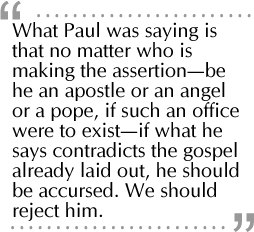Papal Infallibility in Light of Each Believer’s Responsibility
Let’s assume for the sake of argument that the Roman Catholic claims of papal infallibility and the magisterial authority of the church are correct. In other words, when the pope as pope (and not as private individual) speaks an absolute word or when the church leadership as a whole make such a decided proclamation, they are assured of infallibility; and when they  teach without such pronouncements, their general teaching is still binding upon consciences. Would such a situation negate the biblical principle of testing new revelation in light of prior revelation? Well, if there is a timeless biblical principle of testing new revelation in light of prior revelation, of course, it can’t be negated—ever. So how might such a principle be worked out in a world where an institution may still speak for God?
teach without such pronouncements, their general teaching is still binding upon consciences. Would such a situation negate the biblical principle of testing new revelation in light of prior revelation? Well, if there is a timeless biblical principle of testing new revelation in light of prior revelation, of course, it can’t be negated—ever. So how might such a principle be worked out in a world where an institution may still speak for God?
To begin with, how does Scripture present to us this principle of testing new teaching? We find it appearing in Deuteronomy, when the Israelites were told that they were to put to death any prophet who enticed them to follow other gods—even if that prophet worked a miracle! Idolatry is such a blatant departure from the truth; the Israelites should have known better, ought to have known who their God was (their Deliverer in Egypt) and where their allegiance lay. So what if a miracle-working prophet sounds good? “You shall not listen to the words of that prophet or that dreamer of dreams. For the Lord your God is testing you, to know whether you love the Lord your God with all your heart and with all your soul” (Deut. 13:3, ESV). The remainder of the Old Testament, too, is a story of degrees of faithfulness or faithlessness to the covenant and obedience or disobedience to the laws found in the Pentateuch. The psalmists delighted in the law. The prophets lambasted the people for their forsaking of the covenant; the calamities brought upon the nation of Israel were brought upon them because of their departure from the covenant (e.g., Jer. 22:8–9).
When we arrive in the Gospels, we find Jesus rebuking the scholars for their ignorance of the Old Testament (e.g., Mark 12:10, 26). Those of Jesus’ contemporaries who doubted or rejected Him doubted or rejected Him because they had read their Bibles wrongly. Jesus presented Himself as a palpable and inevitable fulfillment of the Old Testament promises: “Search the scriptures; for in them ye think ye have eternal life: and they are they which testify of me” (John 5:39, KJV). And further: “Then he said unto them, ‘O fools, and slow of heart to believe all that the prophets have spoken: ought not Christ to have suffered these things, and to enter into his glory? And beginning at Moses and all the prophets, he expounded unto them in all the scriptures the things concerning himself” (Luke 24:25–27).
The apostles continued the pattern. We are to contend for the faith once delivered (Jude 3), and the assumption is that we know what the faith once delivered is. Timothy was to continue in what he had learned, particularly in light of the false teachers that were surely to come (c.f., 2 Tim. 3:1–7). The Bereans were commended for their testing what they had heard from Paul against Old Testament Scriptures (Acts 17:11). Indeed, Paul felt the need in his preaching and writing to cite an abundance of Old Testament Scripture to support himself (e.g., Rom. 1:17 and other quotations of this Habakkuk passage).
Perhaps the most startling expression of this principle is found in Galatians 1:8–9. For the sake of emphasis, it seems, Paul admonished the Galatians twice, “But though we, or an angel from heaven, preach any other gospel unto you than that which we have preached unto you, let him be accursed. As we said before, so say I now again, If any man preach any other gospel unto you than that ye have received, let him be accursed.” What Paul was saying is that no matter who is making the assertion—be he an apostle or an angel or a pope, if such an office were to exist—if what he says contradicts the gospel already laid out, he should be accursed. We should reject him.
What should individual believers make of this? What is their responsibility toward revelation and claims of authority?
First, the responsibility is laid at everyone’s doorstep. Jesus implied a culpability of one kind or another for not “getting it.” No one can show up on judgment day and say, “But Lord, You weren’t clear enough.”
Second, God regards us as sufficiently equipped with prior revelation to test whether any further revelation or illumination or authoritative pronouncement comports with prior revelation. It makes no matter who is speaking or writing or preaching. He is subject to scrutiny. We could be at fault for not doing so.
Third, there is more than a possibility that there will be those who will make a false claim on behalf of Christ. It is expected that somewhere out there during the interadvent period, there will be deceivers. We are not given their names and addresses. All we’re given is Scripture by which to test them.
So….what if? What if there were such an office as “pope”? Could we slide the pope in right between Paul himself and the angel from heaven? Would he, too, be subject to scrutiny? As far as I’m aware, not even the Catholic Church says that the popes are 100 percent infallible all the time. Nowadays the Catholics I talk to do not try to defend the debauched popes of yesteryear. Is it conceivable that a pope could apostatize? Yes, by Catholics’ own admission. If they apostatize morally, why not doctrinally? Is it conceivable that a pope could become a megalomaniac and try to take over an empire for himself? (I’m just throwing out possibilities. It doesn’t matter to my argument whether such a thing has happened.) Is it possible that a pope could say, “I’m speaking infallibly,” when really he’s lying through his teeth? Isn’t it always important to make sure that a prophet is not a false prophet?
What if a pope were to deny the deity of Christ? Surely Catholics would be obligated to reject him based on prior revelation? To denounce him as a reprobate and a heretic?
What if a pope were to stray from the gospel? What if he were to retain a lot of the biblical furniture but rearranged it in an unbiblical way? What if finally it started gnawing away at an individual believer that perhaps he had been taught another gospel? What would the individual believer need to do to resolve his problem? Would he have to return to the Scriptures and test what he was hearing by them?
How ought the pope to defend himself in such a scenario? Is “Because I said so” a valid counterargument, or should he begin to marshal the Scriptures to show how what he is saying is right in line with everything theretofore revealed? Jesus did; Paul did. (Nor am I saying that Catholic arguments are void of Scripture. I’m just asking about the mode of arbitrating the dispute.) It seems to be the only option. Who has departed from the true gospel—the individual or the institution? There is only one way to find out. For the individual to “shut up and color” would be negligence. Notice that this individual is not necessarily a free-thinking maverick intent on twisting the Scriptures. He is only someone who searches the Scriptures to ensure that what he hears is so.
Even if it were the case that there is an institution out there that sometimes speaks authoritatively for God, I do not find that that would relieve any of us from testing whatever that institution says. I do not see how individual believers are permitted to accept without question whatever they are told.
 Michael Osborne received a B.A. in Bible and an M.A. in Church History from Bob Jones University (Greenville, SC). He co-authored the teacher’s editions of two BJU Press high school Bible comparative religions textbooks What Is Truth? and Who Is This Jesus?; and contributed essays to the appendix of The Dark Side of the Internet. He lives with his wife, Becky, and his infant daughter, Felicity, in Omaha, Nebraska, where they are active members at Good Shepherd Baptist Church. Mike plans to pursue a further degree in apologetics. Michael Osborne received a B.A. in Bible and an M.A. in Church History from Bob Jones University (Greenville, SC). He co-authored the teacher’s editions of two BJU Press high school Bible comparative religions textbooks What Is Truth? and Who Is This Jesus?; and contributed essays to the appendix of The Dark Side of the Internet. He lives with his wife, Becky, and his infant daughter, Felicity, in Omaha, Nebraska, where they are active members at Good Shepherd Baptist Church. Mike plans to pursue a further degree in apologetics. |
- 3 views


Discussion